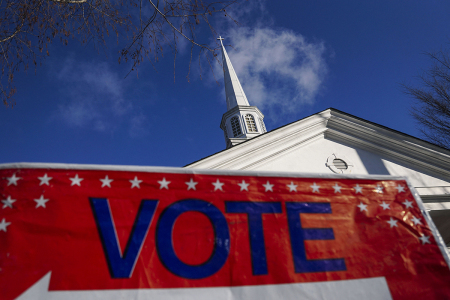'Threat to democracy' or media phantom? Christian nationalism debate takes violent turn

Editors' note: This is part 17 of The Christian Post's year-long articles series "Politics in the Pews: Evangelical Christian engagement in elections from the Moral Majority to today." In this series, we will look at issues pertaining to election integrity and new ways of getting out the vote, including churches participating in ballot collection. We'll also look at issues Evangelicals say matter most to them ahead of the presidential election and the political engagement of diverse groups, politically and ethnically. Read other articles in the series by clicking here.
What happens when "one nation under God" becomes "one God over a nation"?
That's essentially the question at the heart of the controversy surrounding Christian nationalism — what it is, what it isn't, and who, exactly, stands to benefit from such a movement. Is it everyday American Christians in the pews, or is there some other agenda at work?
Before the gunsmoke had barely cleared this summer in Butler, Pennsylvania, after the assassination attempt against former President Donald Trump, mainstream media outlets characterized the response of Trump's Christian supporters and the outpouring of prayers for the former and potentially next president of the United States as a form of Christian nationalism.
There was, after all, a distinct shift in tone among Trump's supporters and allies after the July 13 shooting that wounded Trump and two others and killed firefighter Corey Comperatore.
House Speaker Mike Johnson tweeted that "GOD protected President Trump." Evangelical preacher Franklin Graham told Fox News that Trump was shielded by "God's hand of protection." From his prison cell, former Trump advisor Steve Bannon claimed that Trump "wears the armor of God," while Texas Gov. Greg Abbott noted that Trump was "truly blessed."
It was these and other comments that several media outlets characterized — and even ridiculed — as Christian nationalism.
The New Republic's Ellie Quinlan Houghtaling, for one, appeared to mock the assertion of many Christian Trump supporters who believed divine intervention spared Trump's life. She ridiculed what she called the "theory that the felonious, adulterous, insurrection-inciting, election-denying, convicted rapist was spared by God — even if that same God chose not to save a retired firefighter who died from the bullets shot at Trump."
Denver Post commentator and rabbi Rachel Kobrin also criticized the view of some Evangelicals that God spared Trump's life as "pediatric theology" and "manipulative." Kobrin urged voters to "take back religion here in America and prevent the far-right from manipulating citizens into believing that God saved their candidate and is rooting for their political party and their social agenda."
"We must not let America slide further down the slippery slope toward a dangerous nexus of Christian nationalism and political power," Kobrin wrote.
Just two weeks after the shooting, MSNBC and The Atlantic aired a report on what they described as "increasingly radical Trump rally prayers."
Atlantic staff writer McKay Coppins, who claimed to review 58 pre-rally prayers, told MSNBC he believes these prayers could lead to "a replay of January 6th in [2021] but on a larger scale."
"I have covered more than a hundred Trump rallies and these prayers have evolved over time," said Coppins. "There were prayers in 2016, and I'm sure there were some more extreme prayers like these ones. The theological underpinnings of the prayers have shifted, and the way that they are framing this election as something that has eternal consequences is new from my perspective."
Earlier this year, Coppins' Atlantic colleague Peter Wehner, a former speechwriter in the administrations of three Republican U.S. presidents, who MSNBC identified as a conservative Christian, called Christian nationalism "malicious and dangerous" and a "threat to American democracy."
"It is a desecration of the Christian faith," Wehner added. "I think at the core identity for a lot of these people who are Christian nationalists, it is a whole series of other things — political, partisan, cultural, psychological identities. ... It is important to say that not all Christians or even Evangelicals are Christian nationalists. It is a loose term. But that movement exists and it is growing."
Ian M. Giatti is a reporter for The Christian Post. His latest book, THE ASSEMBLY ON THE ROCK, is set for release Sept. 2024. He can be reached at: [email protected].






















